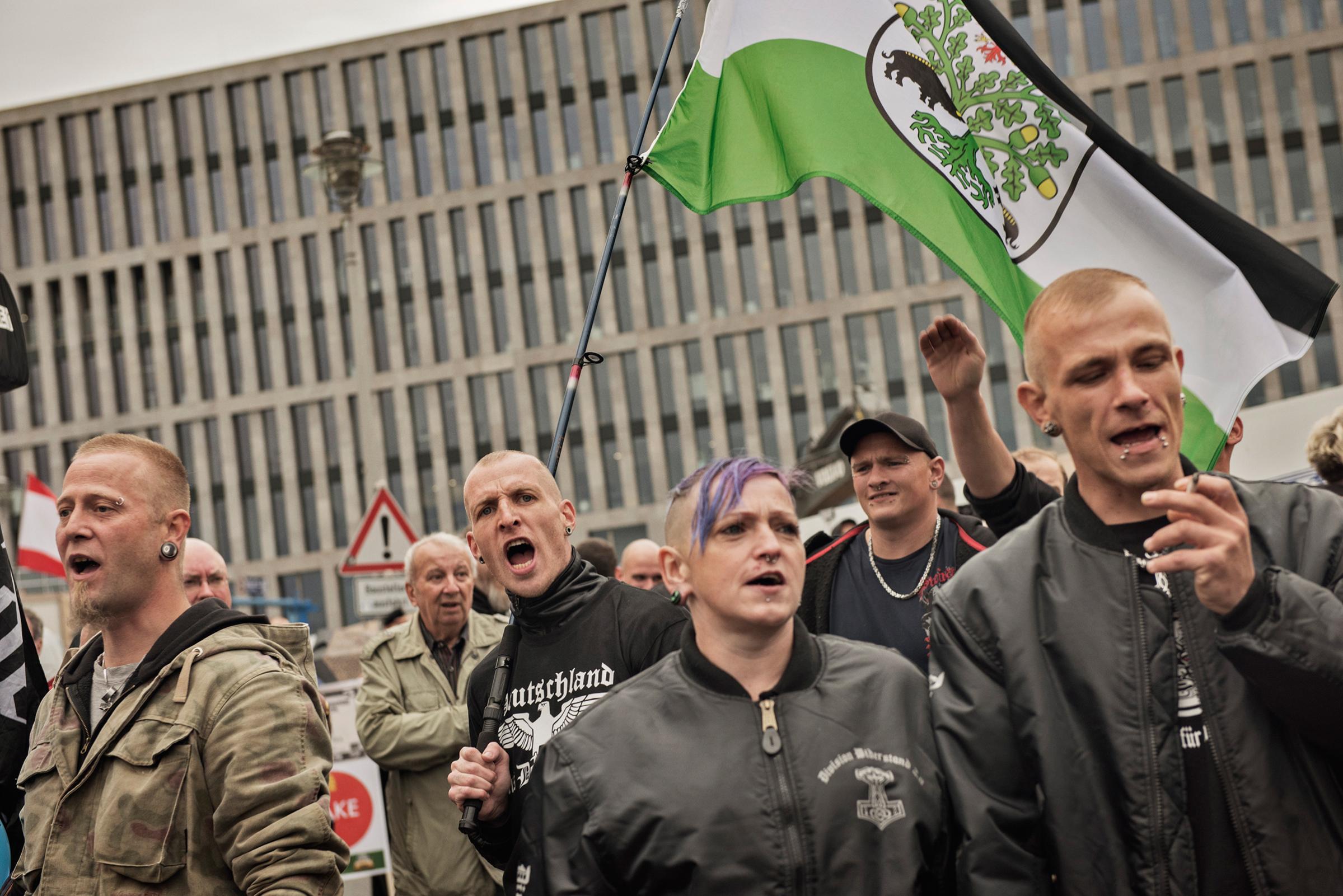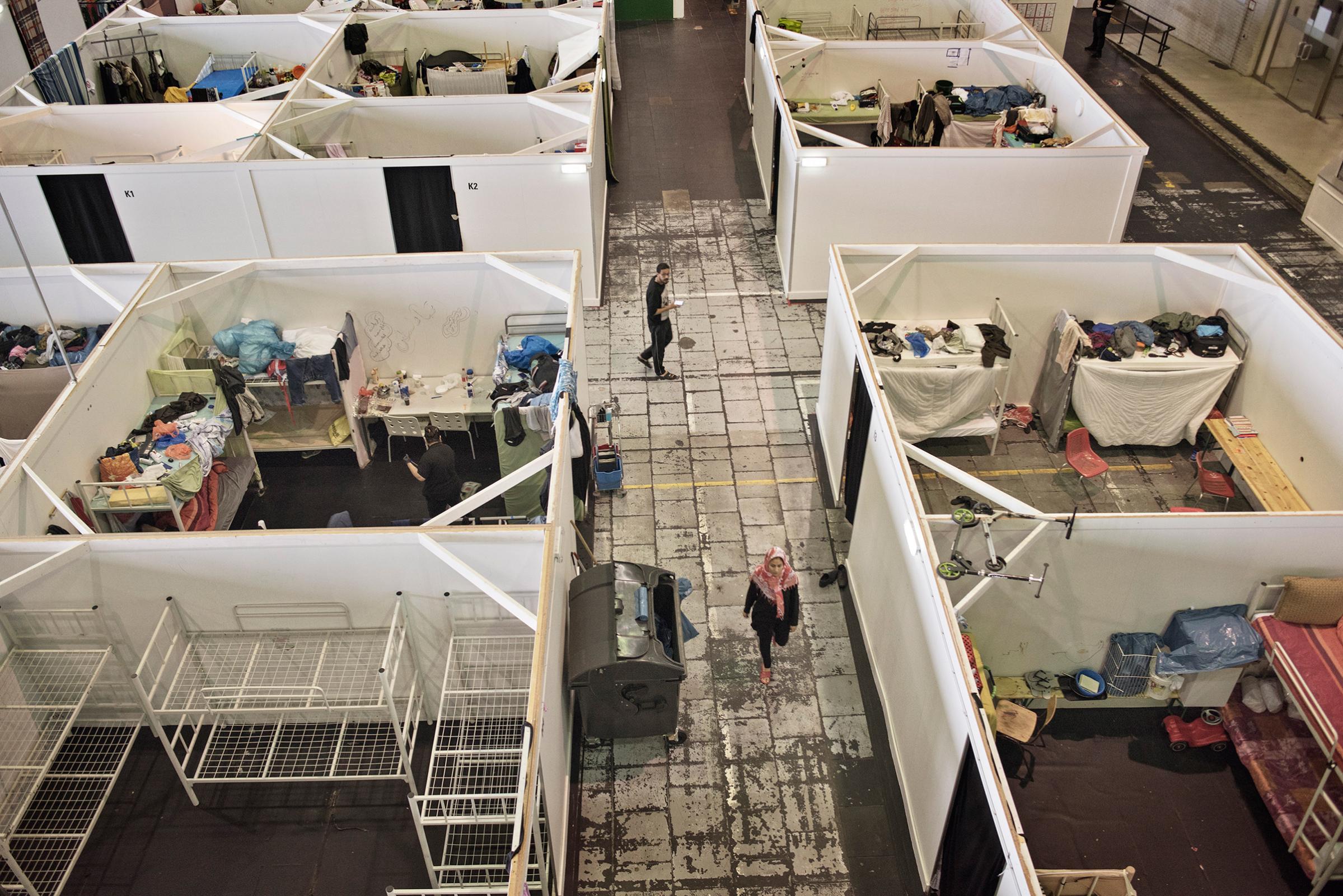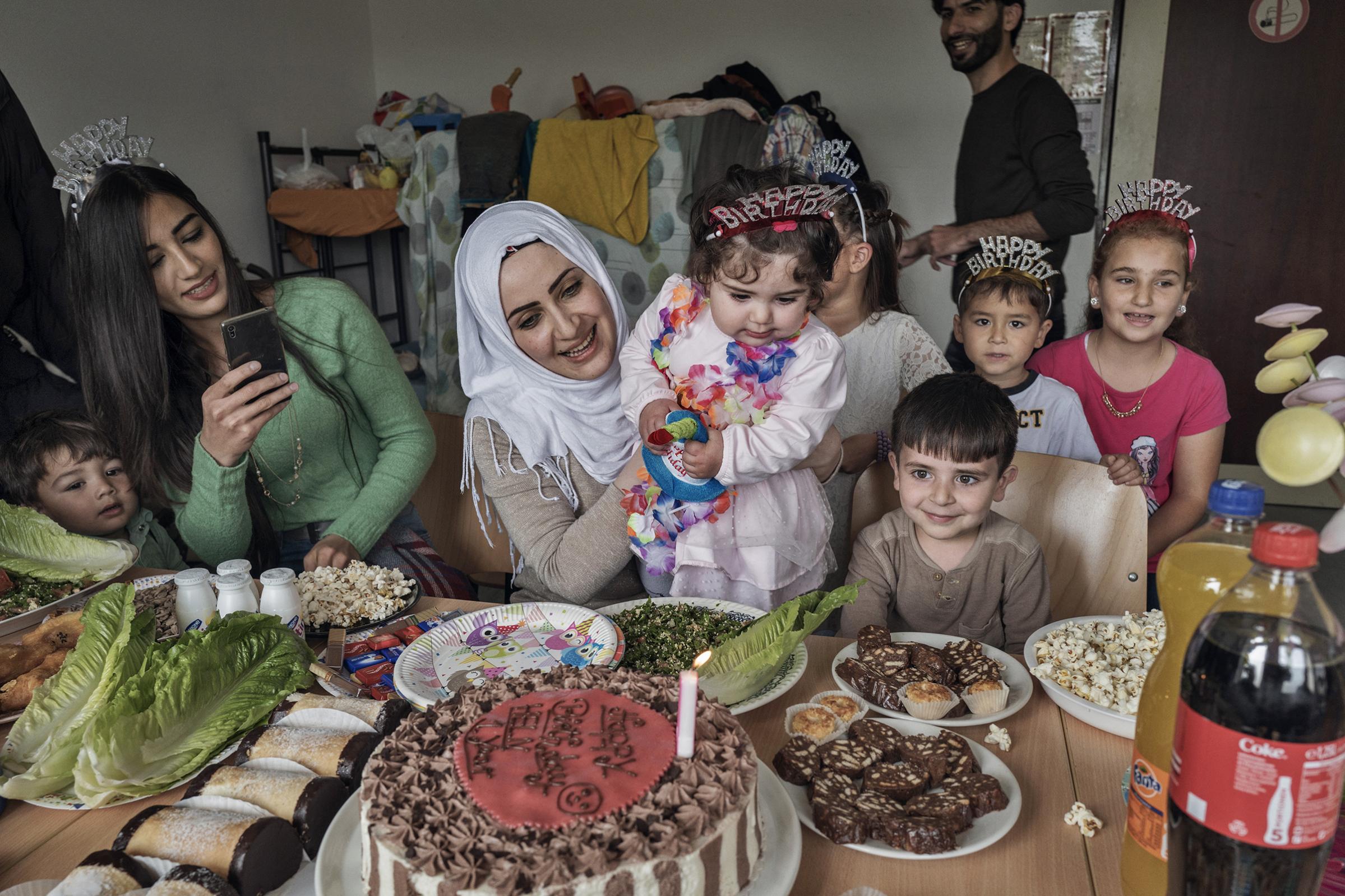
In the summer of 2015, a curious piece of world news brought a flicker of hope to the wretched Syrian city of Palmyra. Islamic State fighters had taken over the ancient town, toppling its monuments and executing anyone who resisted their draconian rules. And yet at one of the city’s darkest moments, rumors of a sanctuary far away began to filter in, generating dreams among a populace that had already lost everything. On Aug. 31 of that year, German Chancellor Angela Merkel declared that her country was prepared to take in hundreds of thousands of refugees fleeing war in the Middle East. “We can do this,” she said in a speech in Berlin, calling it a “national duty” to support those in danger. Across Syria, preoccupations with the civil war gave way to fantasies of an unlikely new promised land: the Germany of Mama Merkel.
The Chancellor suddenly became a positive punch line to dark jokes about Syrians’ futures, says Yehiya Mohammad, a driver from Palmyra who at the time had just been released from one of Syrian President Bashar Assad’s notorious prisons. “People would be talking to each other … One would suggest, ‘Just go.’ ‘Go where?’ ‘Go to Mama Merkel–she’s accepting everyone.'”
As the war eviscerated what was left of Syria’s schools and hospitals, many Syrians like Mohammad realized that they had no choice but to leave if they wanted their children to have a future. Taimaa Abazli, a 25-year-old ethereal beauty from Idlib, had just found out she was pregnant with her second child when she and her family decided to flee. Facebook posts from friends who had already arrived in Germany boasted that their children were enrolled in school and fluent in German. A former music teacher, she was desperate to put her son in school, and she was encouraged by stories of how Germans accepted veiled women. “Because there are many Muslims there, people don’t mind the hijab,” she says. “They don’t look at it as something strange.”
By early 2016, Taimaa and her husband Mohannad had scraped together enough money to pay a smuggler to get the family to Greece. From there, she figured, they could travel by train and on foot to Germany, like hundreds of thousands of Syrians before them.
In the past two years, more than 1 million refugees and asylum seekers have arrived in the Federal Republic of Germany. About half, mostly from Syria, have been granted the right to stay and be resettled across the nation. They are trying to mix in a culture that is famously homogenized, orderly and keenly aware of its unwelcoming past. The Willkommenskultur (welcome culture) that led refugees to pawn wedding rings to pay for perilous Mediterranean crossings and families to become indebted to smugglers promising passage across closed borders hasn’t always been matched by a genuine welcome upon arrival. Although the number of asylum seekers reaching Germany has declined by two-thirds since 2015, federal and state agencies tasked with processing their arrival are still swamped. As a result, most refugees now spend months languishing in temporary camps where they are denied the very elements–school enrollment, formal language courses, job training–that made Germany’s integration program so successful at the start. “We have become too much of an object on which migrants from all over the world pin their longings,” admits Joachim Stamp, minister for refugees and integration in the state of North Rhine–Westphalia. “That is something that we can view positively, but it must also be clear that people don’t automatically embark on a life of bliss the moment they touch German soil.”

Meanwhile, the arrival of all these newcomers has had a powerful effect on German politics. And the court system is so overwhelmed by appeals to asylum rejections that it is struggling to process legitimate deportation orders. One who slipped through the net was Anis Amri, a 24-year-old rejected asylum seeker from Tunisia, who plowed a stolen truck through a Berlin Christmas market in December, killing 12.
Far-right parties in Germany seized on the incident as a rallying cry against Merkel’s refugee policies, and in national elections on Sept. 24, the anti-immigrant, Euroskeptic party Alternative for Germany (AfD) did better than anticipated, coming in third place with 12.6% of the vote. For the first time since World War II, the shrill voices of far-right nationalism will be heard in Parliament. Merkel’s Christian Democratic Union still came in first, with 32.9% of the vote, but it was down from 41.5% in the previous election. Georg Pazderski, leader of the AfD Berlin city chapter, credits his party’s success with voter dissatisfaction over Merkel’s refugee policies. “I think the refugee crisis is certainly one of the reasons that our popularity rose,” he told TIME before the election. Merkel may still be in charge, but the culture in Germany is becoming far less welcoming.
The German dream of Taimaa Abazli didn’t turn out as she expected. By the time her family reached Greece, in March 2016, the borders to northern Europe had been closed under the pressure of so many would-be German asylum seekers. For more than a year, the family was trapped in Greek refugee camps while European leaders devised a plan to more fairly distribute the burden of asylum seekers across the Continent.
For the past year, TIME has been following Taimaa and her family as they navigate the bewildering maze of the European asylum system in search of a home. When her daughter Heln was born, on Sept. 13, 2016, Taimaa was still living in a tent. The only thing that got her through that experience, she says, was the dream of going to Germany. She imagined that by her daughter’s first birthday the family would be settled in a home there. Instead, in April 2017, they were sent to Estonia, along with four other Syrian families, including Yehiya Mohammad’s. Being sent to Estonia, says Taimaa, was “a punch to the stomach.”
So they left after only a few weeks, capitalizing on cheap bus fares and Europe’s open borders to try their luck in Germany. They were not alone. Yehiya’s family, along with the three others, left too. In tearing up their Estonian residency papers, the refugees gave up free housing, generous welfare benefits, language lessons, schooling, job training and a fast track to citizenship–all that to go back to square one in Germany. To Taimaa, the chance was worth the risk. “I lived in a tent, I gave birth, and then I returned to the tent,” she says. “It was dirty and disgusting. I suffered all this in order to get to Germany. That was my goal.”
Now the Abazli family is in Germany and once again in a refugee camp, this one about two hours from Frankfurt. Because they were granted refugee status in a European safe haven, Germany has denied their claims for asylum. So they spend their minuscule camp stipends on lawyers’ fees to appeal the rejections, in the hope of finding a sympathetic judge and staving off deportation back to Estonia. Despite the discomfort of camp life and the constant uncertainty, Taimaa says she made the right decision, even if it meant giving up her baby daughter’s first chance to live in a real home.

It wasn’t until I spent the Muslim holiday of ‘Id al-Adha with Nour Altallaa, another new Syrian mother whose story I’d been following as part of the Finding Home project, that I began to understand that decision. Nour, like Taimaa, gave birth to her daughter while living in a Greek refugee camp. But she and her husband Yousef Alarsan were lucky enough to win the equivalent of the refugee lottery: relocation to Germany. This year, for the first time since the Syrian war split them apart nearly five years ago, the young couple was able to reunite with close family members over an ‘Id meal at a cousin’s apartment in Gelsenkirchen, near Essen.
It was a scene of familial chaos familiar to anyone who has been to a big Thanksgiving dinner. Doting aunts passed babies from lap to lap as a gaggle of toddlers tore through the crowded living room, pausing only to swipe Syrian sweets from a coffee table. A popular Arabic music video played on the large-screen TV. Nour surveyed the scene with a wide smile. “This is the reason why all the refugees want to come to Germany,” she said over the din. “Because so many of our people are already here.”
But as the numbers of refugees have grown, so has Germany’s anti-immigrant sentiment. Some of Nour’s relations say they are frequently harassed for wearing their headscarves in public. There have been cases reported in the media of German doctors refusing to treat refugees and of teachers who won’t accept Syrian children. Overall, hate crimes against refugees have trebled since 2015, according to Anetta Kahane, chair of the Amadeu Antonio Foundation, a civil-society organization that tracks hate crimes and intolerance in Germany.
In the run-up to the September elections, far-right parties like the AfD used anti-Muslim rhetoric to rally support. One campaign poster featured a pair of scantily clad women with the slogan Burqas? We prefer bikinis. It was clear that the campaign was designed to provoke a reaction as much as it was to gain votes: the posters were most prevalent in heavily migrant neighborhoods, hardly the AfD’s target population.
Two weeks before the elections, a gathering of neo-fascist and white-supremacist groups held a protest in Berlin. About 500 black-clad neo-Nazis, pierced and tattooed punks, flag-waving middle-aged white men and older couples marched past Parliament. The event’s theme was “Merkel Must Go,” but the anti-immigrant subtext was clear. Speakers urged the crowd in English to “make Germany great again” by sending immigrants “back to where they came from.” One man held a placard with a photo of a blond toddler surrounded by black children, captioned Germany in 2030. He refused to be interviewed or photographed, calling TIME’s journalists “Lügenpresse,” a Nazi-era epithet used to denounce the media.
Although the AfD tries to distance itself from such groups, the party’s appearance on the national stage is likely to embolden similar demonstrations, now that these groups feel their causes have an ear in Parliament. Political analysts caution that while they may be loud, their numbers are still small–especially when compared with the 9 million Germans involved in donation, volunteer or NGO efforts to help refugees, according to a report from the Organisation for Economic Co-operation and Development. Still, a pro-refugee counterrally held the same day in Berlin saw a far smaller turnout, and there are other indications that the country as a whole is shifting its opinion on the newcomers. In one recent survey, more than half the respondents said refugee children should not immediately receive the same opportunities as German children.
The opportunities for refugees are not as commonplace as the far right–or the refugees themselves–might assume. Employers in the health care, transport and hospitality industries are desperate for workers to take the jobs that few Germans want, but stringent language requirements mean that most refugees must spend up to a year studying before they can even start looking for employment. According to the Federal Employment Agency, only 9% of the newly arrived refugees have found jobs.

Barbara John of the social-welfare organization Der Paritätische, which runs job fairs for refugees, agrees that learning German is vital. But she believes that the focus on courses is a barrier to employment and refugee integration. Learning on the job could be just as effective, John argues, and it would help counter far-right rhetoric that refugees come to Germany only to take advantage of the welfare system. “They don’t come here for the welfare state, but by stopping them from working for the six to nine months it takes to learn German, we accustom them to it,” she says.
Yet to Nour’s husband Yousef, the lengthy integration period is a boon for displaced people looking to start over again, and one of the reasons so many people want to come to Germany. “It’s not an immediate push to go to work,” he says. “It helps refugees stand on their feet, and then it offers them jobs. This is why refugees prefer Germany.”
Taimaa Abazli achieved her dream of celebrating her daughter’s first birthday in Germany, to a certain extent. There were no cousins darting around stealing candy, but there was cake and little foil tiaras for the guests, fellow refugees from Azerbaijan, Afghanistan and Iraq, all living in the camp Taimaa and Mohannad call home. They understand that Germany is not a paradise. But they chafe at the idea that when it comes to where they will build their life and raise their children, they have no choice in the matter. After all, Mama Merkel invited them to Germany, not Estonia. But Stamp, of the state ministry for migrants, holds that while asylum from war and persecution is a human right, “there is no human right to choose the area where one gets that protection.”
Migration experts suggest that one solution to so-called asylum shopping is to require that all E.U. member states offer the same package of benefits, from housing to welfare payments. But that overlooks the intangibles that mark the difference between a temporary refuge and a home. “In Germany, you know that some people hate you,” Taimaa says. “But the government and the country want you there. You feel protected.”
–With reporting by SIMON SHUSTER and NATALIJA MILETIC/BERLIN; FRANCESCA TRIANNI and LAMIS ALJASEM/GELSENKIRCHEN; and ABEER ALBADAWI/KUSEL
For more on these stories, follow the Instagram feed @findinghome
Correction: A photo caption on an earlier version of this story misstated the capacity of Berlin’s Tempelhof refugee shelter. It is 2,400 people, not 7,000.
More Must-Reads from TIME
- Why Biden Dropped Out
- Ukraine’s Plan to Survive Trump
- The Rise of a New Kind of Parenting Guru
- The Chaos and Commotion of the RNC in Photos
- Why We All Have a Stake in Twisters’ Success
- 8 Eating Habits That Actually Improve Your Sleep
- Welcome to the Noah Lyles Olympics
- Get Our Paris Olympics Newsletter in Your Inbox
Contact us at letters@time.com